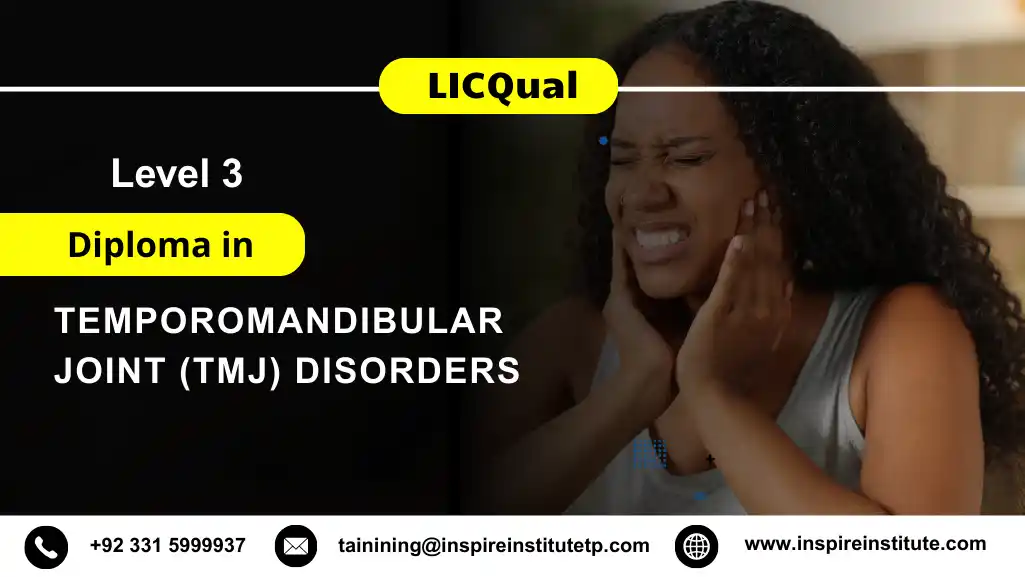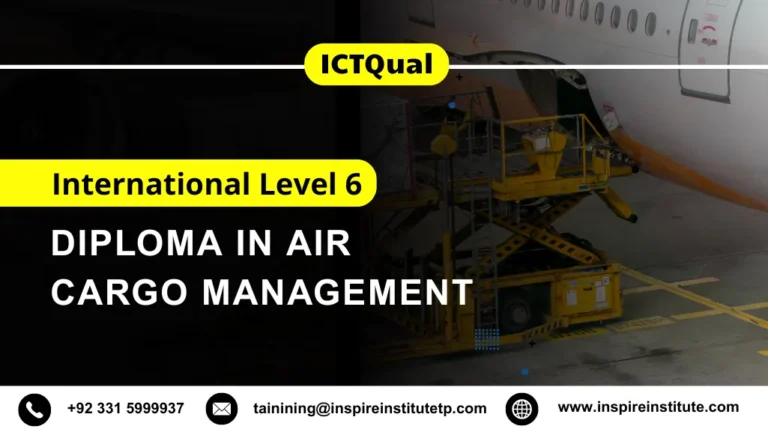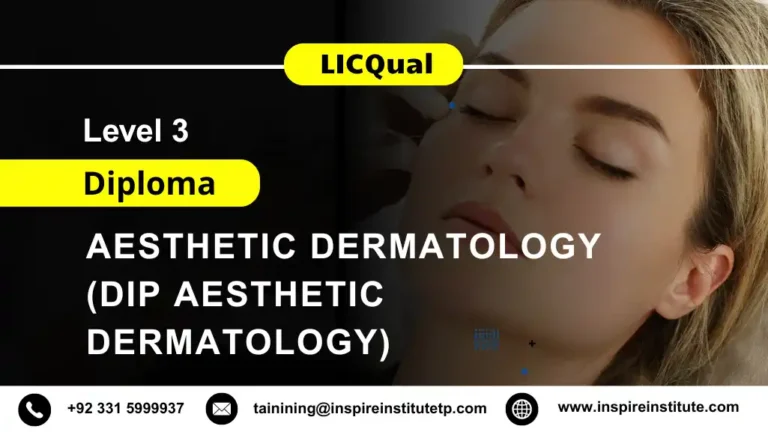LICQual Level 3 Diploma in Temporomandibular Joint (TMJ) Disorders
The LICQual Level 3 Diploma in Temporomandibular Joint (TMJ) Disorders is a UK-accredited qualification developed for dental professionals, students, and clinical support staff who wish to gain in-depth knowledge of TMJ-related conditions. This diploma is designed to build both theoretical understanding and practical competence, enabling learners to identify, assess, and manage a wide range of jaw joint disorders. By combining academic learning with practical insights, the programme equips participants with the skills needed to address functional and structural concerns of the temporomandibular joint in modern dental and healthcare settings.
TMJ disorders are increasingly recognised as a complex and significant aspect of oral healthcare, as they impact a patient’s comfort, ability to chew, and overall quality of life. This programme provides a comprehensive foundation in the anatomy, physiology, pathology, and biomechanics of the temporomandibular joint. Learners gain a deeper understanding of the causes, symptoms, and potential progression of TMJ disorders, developing the ability to recognise clinical indicators and contribute to accurate diagnosis. This knowledge allows professionals to support patients effectively while improving treatment outcomes.
The course also emphasises evidence-based approaches to the management of TMJ dysfunction, ensuring learners are well-versed in both conservative and supportive strategies. Topics covered include splint therapy, pain management techniques, occlusal adjustment, and interdisciplinary collaboration. Participants are encouraged to apply research-driven practices, allowing them to support dentists and specialists in creating effective treatment plans. By building these skills, professionals can help reduce patient pain, restore oral function, and promote long-term oral health.
As a UK-recognised qualification, this diploma enhances professional credibility and opens new career pathways in dental practices, specialist clinics, and broader healthcare environments. It is particularly beneficial for dental nurses, hygienists, therapists, and early-career dentists seeking to develop specialist knowledge. By strengthening their expertise in TMJ disorders, learners are better equipped to collaborate with multidisciplinary teams and provide advanced patient support, thereby improving their value within clinical practice.
Delivered through a flexible and assignment-based learning model, this diploma allows learners to progress at their own pace while balancing professional and personal responsibilities. This structure makes the programme highly suitable for busy practitioners and students who wish to advance their skills without disrupting their work. The accessible format ensures that participants can apply newly acquired knowledge directly to real-world cases, reinforcing both academic and professional growth throughout the course.
The LICQual Level 3 Diploma in Temporomandibular Joint Disorders provides learners with the skills, insights, and professional recognition required to support accurate diagnosis and effective management of TMJ conditions. By equipping dental professionals with advanced knowledge, it enhances their ability to deliver patient-focused care, improve treatment outcomes, and contribute to the development of modern dental practices. This qualification represents an important step for those who wish to grow within the field of dentistry and address the increasing demand for TMJ expertise in healthcare.
Why Choose this Qualification
The LICQual Level 3 Diploma in Temporomandibular Joint (TMJ) Disorders is a UK-accredited qualification tailored for dental professionals, students, and support staff aiming to build specialised expertise in TMJ conditions. This course blends theoretical knowledge with practical awareness to help learners understand the anatomy, pathology, and biomechanics of the temporomandibular joint. Participants explore the causes, symptoms, and management of TMJ dysfunction, preparing them to address issues that affect jaw mobility, patient comfort, and oral function. Designed with flexibility in mind, the diploma follows an assignment-based structure that suits both aspiring and practising professionals balancing work and study.
Key Reasons to Choose this Qualification:
Specialist Knowledge:
Gain in-depth knowledge of TMJ anatomy, function, and pathology to recognise dysfunctions and their impact on oral health. Learners explore clinical features such as joint pain, restricted movement, and muscle-related complications. This foundation equips professionals with the ability to understand the underlying causes of TMJ disorders and contribute effectively to patient assessments and care strategies.
Practical Application:
Develop competence in applying evidence-based approaches to the management of TMJ disorders. The course Temporomandibular explores conservative care methods such as splint therapy, pain management strategies, physiotherapy, and lifestyle guidance. Learners gain insights into treatment planning and supportive roles in interdisciplinary care, enabling them to improve patient comfort and restore oral functionality.
UK-Accredited Diploma:
Achieve a UK-recognised qualification that validates professional expertise and supports career progression in dentistry and healthcare. Accreditation ensures alignment with industry standards and clinical best practices, making this diploma valuable for dental nurses, hygienists, therapists, and early-career dentists seeking to expand their skillset and enhance their credibility in practice.
Flexible Learning:
Benefit from a structured, assignment-based programme that allows learners to study at their own pace. This flexibility is particularly suited to busy practitioners and students balancing professional duties with advanced study. By removing the need for traditional examinations, the course ensures accessibility while maintaining academic rigour and professional quality.
Evidence-Based Training:
Learn contemporary approaches to TMJ disorder diagnosis and management guided by the latest research and clinical protocols. The programme highlights safety standards, regulatory frameworks, and interdisciplinary practices that reflect modern dental care. This ensures participants are fully prepared to support effective, patient-centred treatments in both general and specialist dental settings.
Career Development:
Open pathways into specialist roles in dental practices, clinics, and healthcare institutions with TMJ expertise. The diploma Temporomandibular enhances employability by equipping learners with knowledge and skills that address a growing area of oral healthcare demand. It also provides a strong foundation for those wishing to pursue higher-level qualifications in dentistry or related fields.
The LICQual Level 3 Diploma in Temporomandibular Joint (TMJ) Disorders equips learners with the specialist expertise needed to understand, manage, and support the treatment of jaw joint dysfunctions effectively. By combining theoretical insights with practical application, it strengthens clinical competence and improves patient outcomes. This diploma is particularly valuable for dental professionals who wish to enhance their career prospects, contribute to multidisciplinary care teams, and meet the increasing need for TMJ expertise in modern oral healthcare. It represents an essential step towards delivering safe, evidence-based, and patient-centred treatment in dentistry.
Course Overview
LICQual UK Awarding Body
Average Completion Time:
4-12 Months
Study Units: 6 Units
Evidence & Assignment Based
Mandatory Units
Who Should Take This Course
The LICQual Level 3 Diploma in Temporomandibular Joint (TMJ) Disorders is designed for dental and healthcare professionals who wish to develop specialised knowledge in the diagnosis, management, and treatment of TMJ-related conditions. This UK-accredited qualification is ideal for practitioners aiming to strengthen their clinical competence, enhance patient outcomes, and progress within the field of dentistry. It equips learners with essential theoretical insights and practical approaches to address TMJ dysfunctions, supporting both professional growth and improved quality of care in modern dental practice.
This course is suitable for:
Dental Surgeons: Practitioners seeking to expand their clinical expertise by understanding Temporomandibular TMJ pathology, dysfunctions, and treatment options, enabling them to provide comprehensive care and patient-focused solutions.
Dental Technicians: Professionals wishing to broaden their knowledge of occlusal and joint-related issues, helping them align laboratory work with clinical needs in cases where TMJ problems affect restorative and prosthetic treatments.
Dental Nurses and Support Staff: Individuals aiming to develop awareness of TMJ-related care to provide effective chairside support, assist with conservative management techniques, and improve communication in patient care.
General Dentists: Dentists who want to strengthen their ability to recognise Temporomandibular TMJ disorders, plan appropriate treatments, and collaborate with specialists to deliver long-term, patient-centred care.
Aspiring Dental Professionals: Learners preparing for higher-level dental qualifications who want to establish a strong foundation in understanding jaw joint function, dysfunction, and evidence-based treatment approaches.
Dental Hygienists and Therapists: Practitioners aiming to expand their role in managing TMJ-related cases, including preventive care, supportive therapies, and contributing to multidisciplinary patient management.
Healthcare-Oriented Learners: Those interested in the science and management of Temporomandibular TMJ disorders, focusing on their impact on oral health, patient comfort, and overall well-being in dental and healthcare practice.
The LICQual Level 3 Diploma in Temporomandibular Joint Disorders is particularly valuable for dental professionals seeking to strengthen their technical expertise, enhance patient outcomes, and gain a UK-accredited qualification. By combining evidence-based knowledge with practical application, this diploma supports career development, professional recognition, and the ability to meet the growing demand for TMJ-related care in modern dentistry.
Course Benefits
The LICQual Level 3 Diploma in Temporomandibular Joint (TMJ) Disorders provides significant benefits for dental and healthcare professionals aiming to develop expertise in the diagnosis, management, and treatment of TMJ-related conditions. By combining theoretical knowledge with practical approaches, this diploma equips learners to address complex functional and structural jaw issues, improve treatment planning, and enhance patient well-being. Designed as a flexible, assignment-based programme, it supports career development while upholding professional and clinical standards in modern dentistry.
Key Benefits of the Course:
- Specialist Knowledge: Gain an in-depth understanding of the anatomy, pathology, and biomechanics of the temporomandibular joint. Learn the causes, symptoms, and classifications of Temporomandibular TMJ disorders, enabling professionals to make informed clinical decisions.
- Practical Application: Develop confidence in recognising TMJ dysfunctions and supporting treatment through conservative management, splint therapy, and multidisciplinary care strategies to restore function and reduce discomfort.
- Recognised Qualification: Earn a UK-accredited diploma that enhances professional credibility and opens career opportunities in dental practices, specialist clinics, and healthcare institutions. Accreditation ensures alignment with current professional standards.
- Flexible Learning Pathway: Benefit from an assignment-based study model that allows learners to manage academic progress alongside clinical work, making it suitable for both aspiring and practising professionals.
- Evidence-Based Training: Gain insights into modern approaches to TMJ management based on scientific research, clinical evidence, and international treatment guidelines, ensuring safe and effective practice.
- Career Development: Open doors to career progression in roles such as dental practitioner, clinical support specialist, or pathway into advanced dental studies focusing on oral medicine and temporomandibular care.
- Enhanced Patient Care: Contribute to improved quality of life for patients by recognising TMJ disorders early, supporting accurate treatment pathways, and delivering care that restores comfort, function, and oral health.
- Professional Growth: Strengthen diagnostic reasoning, technical knowledge, and collaborative skills within dental and healthcare teams, preparing professionals to play a key role in the multidisciplinary management of TMJ disorders.
The LICQual Level 3 Diploma in Temporomandibular Joint (TMJ) Disorders equips professionals with specialist expertise, practical competence, and a UK-recognised qualification. It empowers learners to enhance patient outcomes, expand their clinical roles, and advance their careers while addressing the increasing demand for TMJ-focused care in modern dentistry.
Eligibility Criteria
The LICQual Level 3 Diploma in Temporomandibular Joint (TMJ) Disorders is a UK-accredited programme designed for dental and healthcare professionals who wish to expand their expertise in diagnosing, managing, and supporting patients with TMJ-related conditions. This assignment-based qualification combines theoretical knowledge with practical insight, making it ideal for dentists, hygienists, therapists, nurses, and support staff who aim to develop specialist skills in this growing field of oral healthcare. By meeting the entry requirements, learners ensure they are well-prepared to succeed in the programme and apply their knowledge confidently in professional practice.
Educational Background:
Applicants should have a secondary school qualification or equivalent. A background in dentistry, dental nursing, dental technology, or healthcare is preferred, though those with relevant interest and commitment may also apply.
Professional Experience:
Prior experience in dental practice, clinical support, or healthcare is beneficial but not mandatory. Both aspiring and practising professionals are welcome to join the course.
Age Requirement:
Learners must be at least 18 years of age at the time of enrolment, ensuring they possess the maturity and responsibility needed for professional training.
Language Proficiency:
Since the programme is delivered in English, learners should demonstrate proficiency in reading, writing, and understanding English to effectively complete assignments and engage with course materials.
Technical Requirements:
Applicants should have basic knowledge of dental or healthcare practices, along with the ability to use digital platforms for assignment submission and online study.
Required Documents: Submission of a valid ID or passport and proof of educational qualifications is necessary for registration.
The Qualification Process
LICQual Level 3 Diploma in Temporomandibular Joint (TMJ) Disorders follows a structured pathway to ensure learners gain comprehensive knowledge, practical skills, and professional competence in community oral healthcare.
Step 1: Self-Assessment
Learners review the entry requirements to confirm eligibility. Candidates with a background in dentistry, oral health, or public health are encouraged to apply.
Step 2: Registration
Complete the registration process by submitting required documents such as proof of qualifications, a valid ID, and payment of enrollment fees.
Step 3: Induction
An induction session is conducted to:
- Verify learner eligibility and documentation.
- Introduce study materials, learning outcomes, and assessment procedures.
Step 4: Learning and Evidence Submission
Learners complete assignments, case studies, and practical exercises demonstrating competence in public health dentistry, community oral health assessment, preventive strategies, and program planning.
Step 5: Feedback and Revision
Assessors review submitted evidence and provide constructive feedback. Learners can revise and resubmit work to meet all required standards.
Step 6: Competence Validation
Final submissions are evaluated to confirm that learners have met all theoretical and practical learning outcomes.
Step 7: Internal Quality Assurance (IQA)
The IQA team reviews the assessment process to ensure accuracy, fairness, and compliance with international standards.
Step 8: External Verification (EQA)
External verifiers validate the authenticity and quality of learner achievements.
Step 9: Certification
Upon successful verification, learners are awardedLICQual Level 3 Diploma in Temporomandibular Joint (TMJ) Disorders , demonstrating advanced proficiency in community oral healthcare and preparing them for professional growth in dental public health, preventive dentistry, and healthcare policy.







